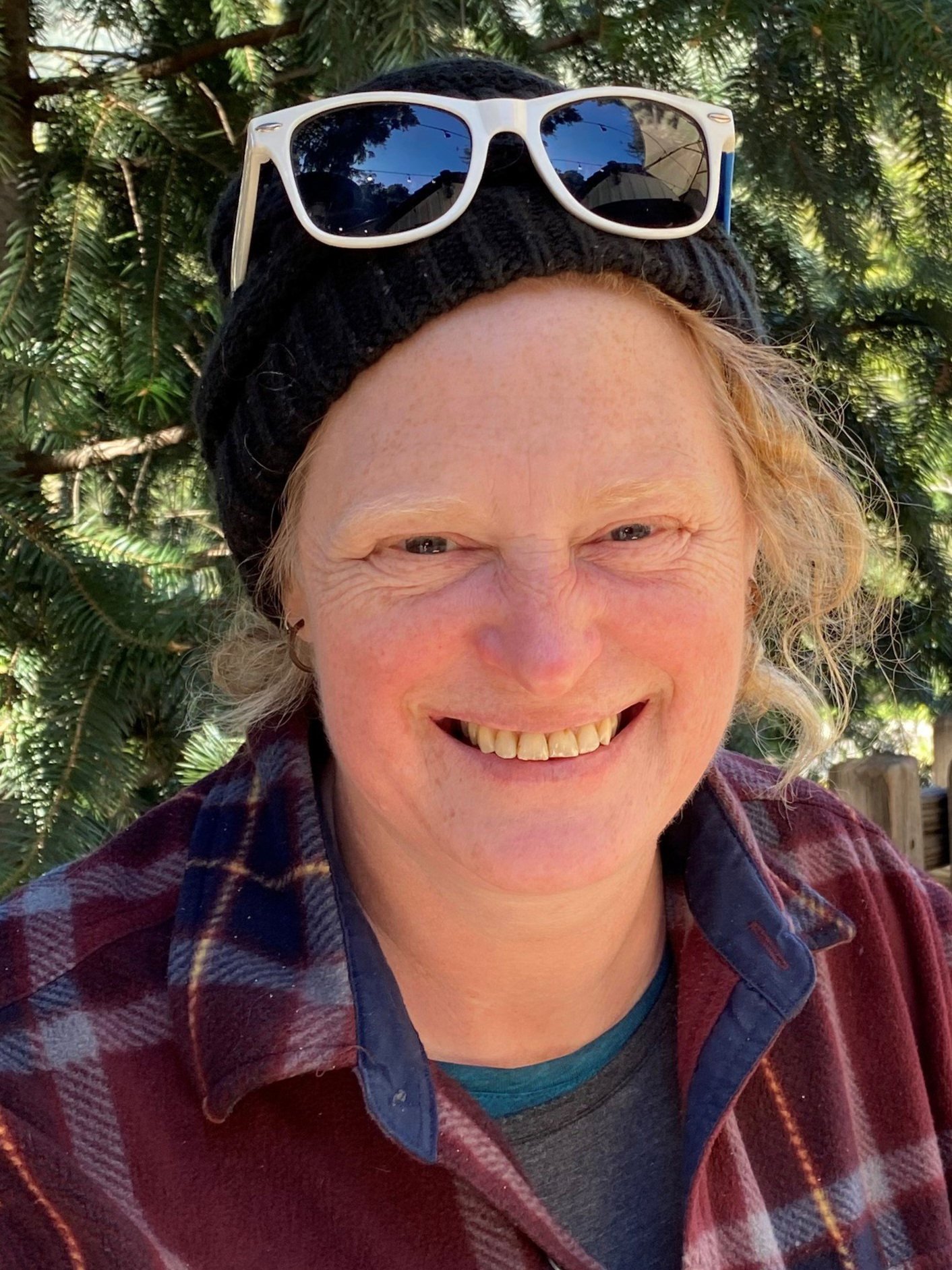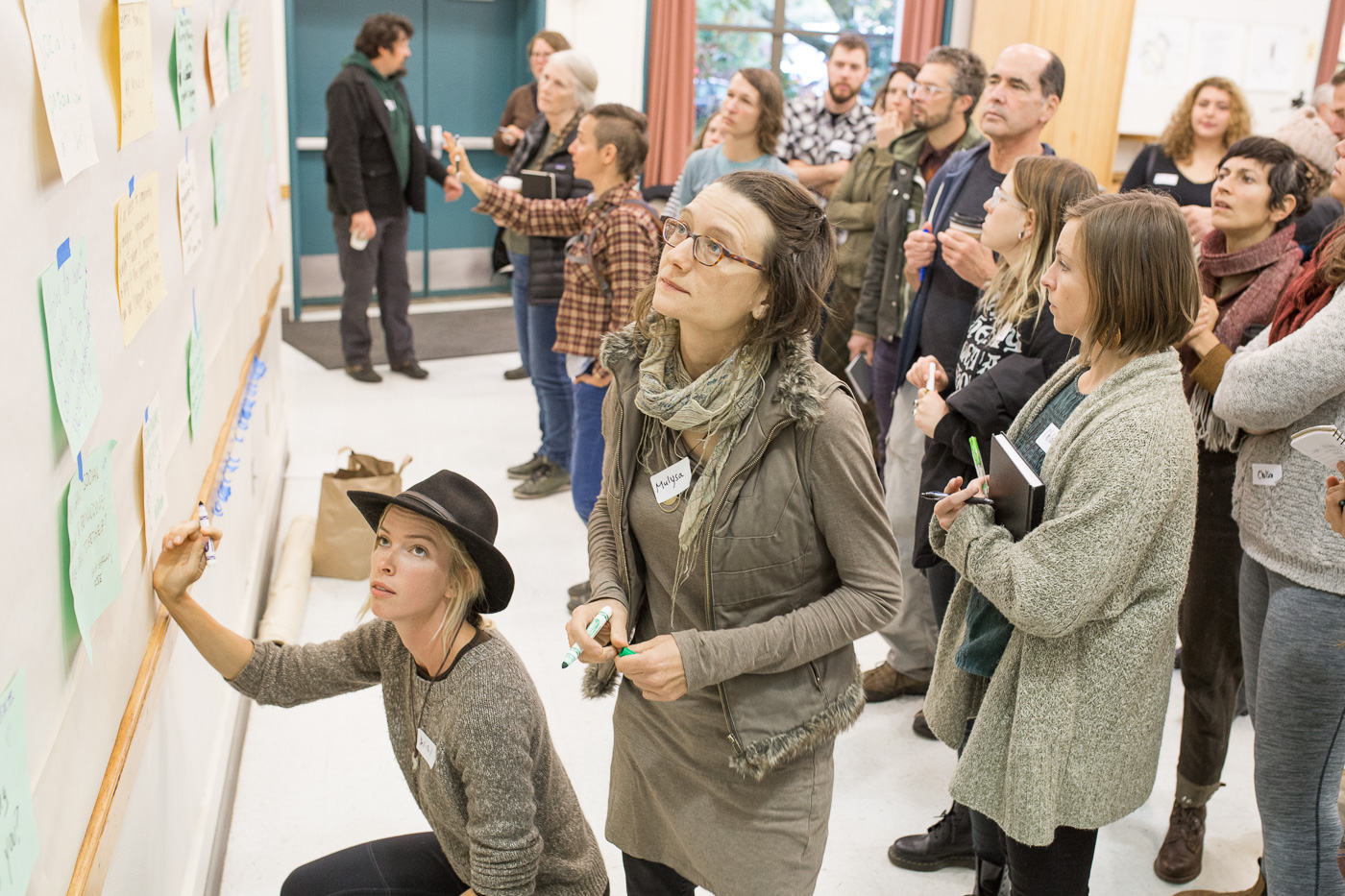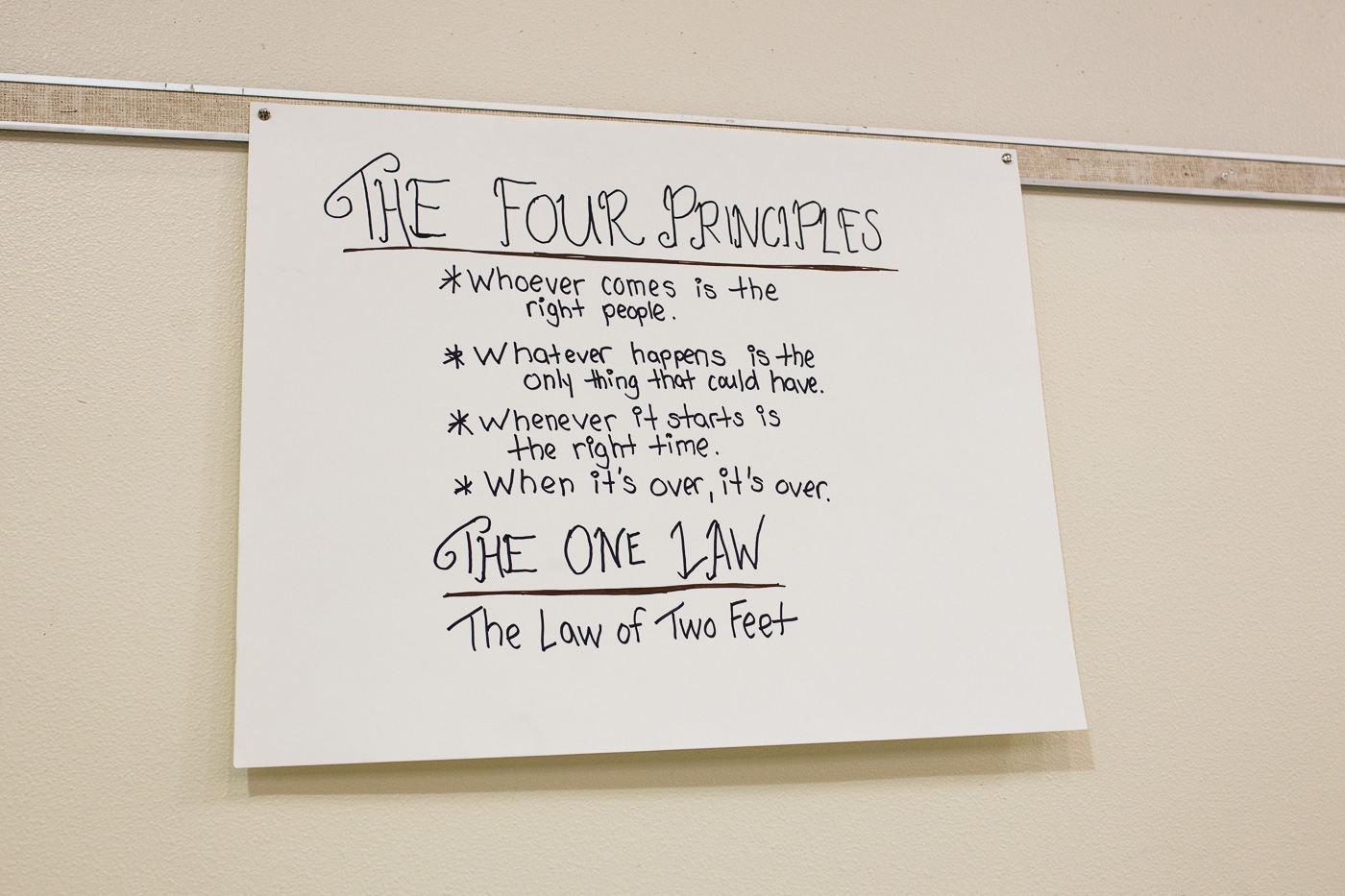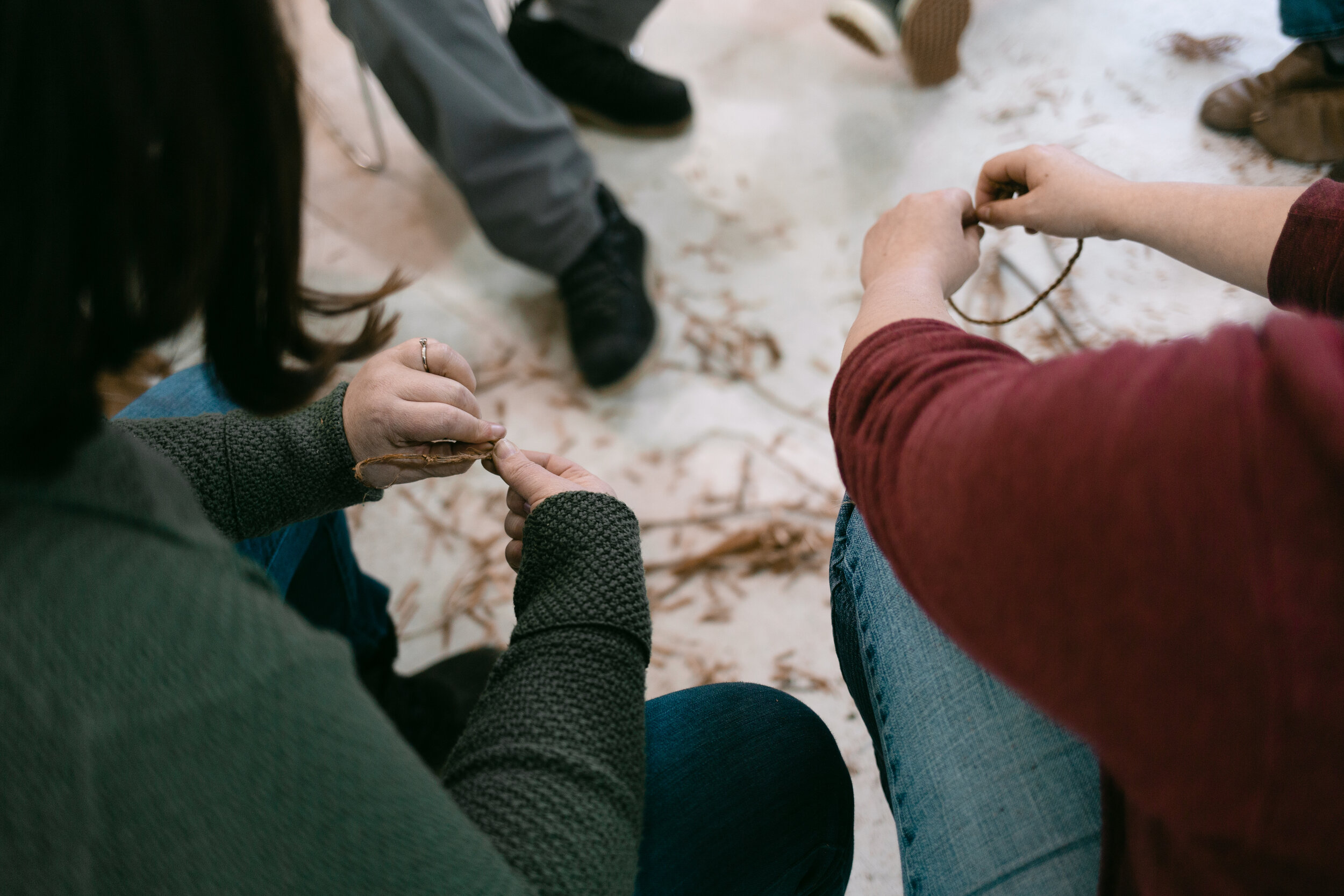“The best time to plant an oak tree was thirty years ago. But the second best time is today.”
Our Mission
The mission of the Rewilding Conference is to unite the many individuals, groups, and institutions who are working hard under the banner of “rewilding” to restore the earth’s ecosystems and the human place therein.
January 26–28, 2024
Online via WHova
The Annual North American Rewilding Conference is a hybrid conference with the majority of it taking place online with some in-person meetups and watch parties. The conference is one part Speakers and one part Open Space. It is a think tank of some of the continent’s most inspiring rewilders and rewilding projects, as well as a social networking opportunity for rewilders. Here you will find individuals and grassroots organizations collaborating on a range of rewilding-related fields including ancestral technology, decolonization, wildlands restoration, ethnobiology, reintroduction of species, social and environmental justice, traditional ecological knowledge, and much more. This event is brought to you by Rewild Portland, a nonprofit organization serving the Portland area and the rural and wild areas beyond. Proceeds from this event go to the speakers and to supporting Rewild Portland's mission to promote cultural and environmental resilience.
What is Rewilding?
Rewilding is the process of creating autonomous, place-based, regenerative subsistence cultures. It is rooted in social and environmental justice: in order to shift our culture to a regenerative subsistence model, we must dismantle the social systems in place that prevent people from doing so. At its core, rewilding is about restoring the health and vitality of our minds, bodies, relationships, communities, and ecosystems.
A note on the word wild: Though it carries many connotations, wild comes from the word willed. The “wild” things were and are the willed things: things that exist outside of civilization’s domination. This is why the myths of civilization simultaneously demonize and romanticize the “wild”; civilization hates and fears what is out of its control, yet also desires and fetishizes them (think: wild stallion). It is this attempt to control that which cannot be controlled that leads to destruction of ecosystems, health, and human relationships. Rewilding is, therefore, an attempt to return to lifeways that work with the flows, the wills, and cycles of nature rather than waging an all-out war to control them.
Hybrid Conference
The major components of the conference take place online, using the Whova conference platform. These are the Keynote Address, Speakers, and Open Space. In-person events are organized by participants and consist of pre and post conference meetups, and watch parties for the speakers.
Conference Schedule
Friday, Jan. 26, 6–9 pm (PST) || Keynote
Saturday, Jan. 27, 9 am–5 pm (PST) || Speakers
9–10 am | Peter Michael Bauer
10:30–11:30 am | Paule Wood
11:30 am–1 pm Lunch
1–2 pm | Jodie Buller
2:30–3:30 pm | Brandt Stickley
4–5 pm | Edith & Randy Woodley
Sunday, Jan. 28, 9 am–5 pm (PST) || Open Space
9–10 am | Open Space Intro
10–11 am | Session 1
11 am–12 pm | Session 2
12 pm–1:30 pm Lunch
1:30–2:30 pm | Session 3
2:30–3:30 pm | Session 4
3:30–4:30 pm | Session 5
4:30–5 pm | Conference Closing
Keynote (Friday)
Delia Fian
Delia Fian is a basket weaver and teacher, making her way towards a handmade life in the mountains of Appalachia. She directs School of the Greenwood, a nonprofit devoted to rewilding through imagination and creative empowerment. At Greenwood, she teaches earthskills and handcrafts, supporting connection to the land through storytelling and live action role play. When not teaching, Delia is passionately exploring the fibers of place—hunting the limits of all that is possible in weaving material culture on the margins of mainstream society.
School of the Greenwood
www.schoolofthegreenwood.org
Speakers (Saturday)
Peter Michael Bauer
SubsistEnce as Resistance: Setting the Stage for the Rewilding Conference
How did “Subsistence as Resistance” come to be the perennial theme and central conversation of the Rewilding Conference? What material realities keep us locked into an extractive economy rather than a regenerative one? This core discussion will be presented as the opening and closing of the conference.
Peter Michael Bauer is an anthropologist, experimental archaeologist, historian, bushcraft instructor, and life-long community organizer. He is the founder and director of Rewild Portland, author of Rewild or Die, and host of the Rewilding Podcast. An avid advocate for wildness, his work has focused on the social and environmental impacts of the so-called neolithic revolution, and how understanding these impacts can provide us with solutions to the sixth mass extinction.
Paule Wood
Rewilding Loneliness: A Crisis of Community and Loss of Shared Spaces
So-called "developed" nations have the highest rate of loneliness in the world. When we think of rewilding, it's often the romanticized vision of the rugged, capable individual in a pristine forest. However, long-term feelings of loneliness and social isolation can reduce cognitive skills, such as the ability to concentrate, make decisions, and problem-solve. In the face of increasing authoritarianism and populist xenophobia, all we really have is each other in the day-to-day context we’re in.
Paule Wood (they/them) has a background in Human Centered Design and has been professionally designing complex systems for two decades. A practitioner of de-armouring and Northern European ceremonial and personal magic, they are the co-iniator of the community organization Rewild Salish Sea, part of the Rewild Alliance.
Jodie Buller
Remaking Our Ways with Death Practices: Conservation Burial and Community-Led Death Care
Reconnecting the threads of dying and death care—engaging with these processes is tough, and beautiful, and life-altering, and ridiculous, and involves both logistics and intuition, and occasionally activism.
Let’s talk about what is possible within the spectrum of dying and death care for family, community, and with professional resources. Supporting someone’s dying at home, hosting a home funeral wake, making a shroud or casket, driving your dead person out to the cemetery, helping with lowering and closing their grave—each of these possibilities to engage with the tangible aspects of death and grieving and burial is a way to reclaim and reconnect the web of living and dying. The relationship that we have with death is intimately personal, and complex—and there are ways into the deeper heart of it all, that strengthen community threads and bonds.
Conservation burial is a way for communities to bury their dead together, in all the complexity, and with the intention of working with the earth.
Jodie Buller lives part-time on the Swinomish Reservation and part-time at Ekone with an under-the-cabin cat called Phil. Ekone Ranch and White Eagle Memorial Preserve are part of a 501(c)(3) land stewardship organization called Sacred Earth Foundation, which runs summer camps and hosts adult programs on traditional indigenous Ka-milt-pah land in southern Washington. White Eagle is a 20-acre ponderosa and oak forest conservation burial ground. Jodie has been the sexton at White Eagle since 2013, is a founding member of the Conservation Burial Alliance, and helped create the community-led death care resource websites washingtonfuneral.org and oregonfuneral.org.
Brandt Stickley
Rewilding Chinese Medicine
With looming collapse, geopolitical intrigue, and climate impacts, what is the future of Chinese medicine in our region? And, what does rewilding look like? By tracing the fascinating story of a historical herbal text (most recently transmitted via memorization!) we will uncover a Daoist model of local, bioregional herbal medicine that conforms to the cosmology and physiology of classical Chinese medicine, communicates respectfully with local indigenous herb lore, and flourishes locally in communication with the plants and Land.
Brandt Stickley is an acupuncturist and Chinese medicine teacher specializing in Chinese medicine (anti)Psychiatry.
Edith and Randy Woodley
Land as Our Relative
The difference between a Western worldview and an Indigenous worldview boils down to whether or not we can understand the land, and the whole community of creation as our relations. We will share our experiences in starting three farms and how we have come to know the land on each, as well as the values that sustain an Indigenous worldview.
Randy Woodley, PhD, has been referred to as farmer, author, activist, scholar, distinguished speaker/teacher, and wisdom keeper. He has been interviewed and quoted in venues such as The New York Times, Politifact, Time magazine, and The Huffington Post. Randy addresses a variety of issues concerning American culture, our relationship with the earth, and our spirituality. Dr. Woodley, recently retired with tenure as Distinguished Professor of Faith and Culture Emeritus at Portland Seminary and Director of Intercultural/Indigenous Studies. Raised near Detroit, Michigan, he is a Cherokee descendant recognized by the United Keetoowah Band of Cherokee Indians in Oklahoma. Randy co-hosts the Peacing It All Together podcast with Bo Sanders. Dr. Woodley and his wife Edith are co-sustainers of Eloheh Indigenous Center for Earth Justice and Eloheh Farm & Seeds, a regenerative farm, school, community and ceremonial grounds in Yamhill, Oregon. His books include Becoming Rooted: One Hundred Days of Reconnecting with Sacred Earth, Indigenous Theology and the Western Worldview: A Decolonized Approach, The Harmony Tree: A Story of Healing and Community, and Shalom and the Community of Creation: An Indigenous Vision.
Edith Woodley is co-founder and co-sustainer of Eloheh Indigenous Center for Earth Justice and Eloheh Farm & Seeds. Edith is a member of the Eastern Shoshone tribe, having been raised on the Wind River Reservation in Wyoming. She has a degree from Bacone Indian College and has been a vital part of serving the Indigenous community with Randy for over thirty years. She mentors others in the spirituality of the land, farming methods, seed-keeping, how to raise a family on healthy food and is one of the teaching grandmas in the Decolonizing with Bad-ass Indigenous Grandmas co-hort. Edith and Randy served together as members of the Native Climate Council of the Greater Portland Metro Area, Advisory Board (2015–17) and in 2021 they were given the Ecumenist of the Year Award by Ecumenical Ministries of Oregon, the first time given to a couple. They have four grown children and six grandchildren. Web: eloheh.org, randywoodley.com, elohehseeds.com, I.G. Eloheh/Eagle's Wings, FB: Randy Woodley Author/Speaker, Eloheh Farm, Eloheh Indigenous Center
Open Space (Sunday)
At its heart, the Annual North American Rewilding Conference is set up for the Open Space portion of the conference. Open Space Technology is a non-hierarchical, organic, social collaboration tool best used to discuss and create solutions to a specific problem or issue. We have chosen to emphasize Open Space Technology because it is a way of rewilding a conference. Open Space does not operate like a traditional conference, in which only presenters or speakers give lectures or teach classes. While traditional conferences are structured so that a few people talk at you, Open Space allows us to generate discussions between everyone in the field of rewilding, from "experts" to enthusiasts, and at all levels, from institutional to grassroots. All participants arrive on the Open Space morning, create the topics, and lead the discussions. You can take part in whatever discussions you want. One of the most amazing things about Open Space is that it puts the known experts on the same field as the unknowns and laypeople. Everyone has something to contribute in a community, and Open Space is a way of pulling ideas out of the zeitgeist of the movement rather than expecting to only ever hear solutions from a few "thinkers." In an Open Space conference, everyone is equal and all ideas have an opportunity to be discussed, in real life, face to face with other humans.
How Open Space Works
Participants create the agenda first thing on the morning of the Open Space. People are given the opportunity at this time to announce their session to the entire group. Sessions can be added any time during the Open Space, but the morning agenda creation is the only time people are able to announce a session to the entire Open Space. This is an opportunity to discuss your burning passions and questions around rewilding. At Open Space, it’s the participants responsibility to make sure the things they feel are most needed to be discussed, are. This means if someone else doesn’t bring up the topic you wanted to discuss, it’s on you to make it happen! There is no pressure to “teach” or be knowledgeable in the area you want to discuss: as a session holder, you simply must hold space for the topic. You can host a session on something you know nothing about, as a way to bring in people who are passionate about the subject and may have the answers you’re looking for.
After announcing their session topic, including when and where they will be held, participants then enter them on the Open Space "Wall of Confluence" spreadsheet. The spreadsheet is a grid with a list of session times down one side and “locations” (breakout rooms) across the top. This is a open access spreadsheet shared with all participants. The Wall of Confluence contains the agenda and schedule. All participants will receive an email with an access link to the Wall of Confluence.
Once the session announcements are over, the Open Space begins. Participants then choose which sessions they would like to attend. Open Space Technology has five "principles" and one "law." The five principles are: Whoever comes are the right people. Whenever it starts is the right time. Wherever it happens is the right place. Whatever happens is the only thing that could have happened. And when it's over, it's over. The one "law" is the law of two feet: if at any point during our time together you find yourself neither learning from nor contributing to the discussion, use your two feet and go someplace else. At the end of the day, participants come back together to share moments of the day.
Skills “Corner”
A small corner of the Open Space (a single digital room) is reserved for working on ancestral skills. This is a place to share, teach, and practice natural hand crafts. While dialogue and conversation are the central themes of this conference and not ancestral skills (check out our summer gathering Echoes in Time for a focused week of skills building), we offer this space as a way of grounding our dialogue through handwork. Come relax and work on a project, share something you are working on, or teach a mini skills session. You can, of course, work on crafts during any and all sessions of the conference. This space is simply dedicated to discussing and working on hand crafts at the same time.
In-Person Meetups
The majority of the Rewilding Conference is online. However, we strongly encourage participants to host in-person meetups. These can range from pre-conference and post-conference socials and land-tending work parties to watch parties during the Keynote and Saturday speakers. Community building is an essential component of rewilding, so we hope you’ll connect with others in your region! On the Whova platform, we have detailed descriptions on how to host your own in-person event in tandem with the Rewilding Conference. Our goal is to give participants the tools to organize their own rewilding communities wherever they live, to help grow the roots of rewilding in many places all over the continent (and the world). This also encourages more people to attend the conference.
Testimonials
"Nowhere else in my world are people having the conversations that people at Rewild are having. This is not because people aren't dying to talk about these topics but because the conditions haven't been created in enough spaces. Environmental education that doesn't address the inner violence of colonial culture won't get past mere skills, and we can't simply bow-drill our way out of modern problems. I left the conference feeling a grounding sense of awe and gratitude—something truly special happened this weekend and I only wish we didn't have to wait another year to gather like this again." - Colleen
"The conference left me feeling inspired and connected to a large base of people working on radical change in our world. The culture was supportive and exploratory, with so much room for our human cracks. I felt encouraged at the way people listened and shared openly, allowing the depths of what we truly care about to be seen." - Heron
"What an amazing weekend! The simplicity and power of the open space format allowed for our individual and collective brilliance and inquiries to steer us. It was humbling to both contribute and listen to the intellect, heart, skills, songs, and stories of our community. I came home full of a richness of practical next steps, inspiration, and new friendships. I am so grateful to have attended and already added next year's dates to my calendar." - Leah
"The Rewilding Conference provides a truly unique chance to provoke thought and inspiration while nurturing mutual opportunity and community connection. This brilliant band of folks brave enough to peek through the looking glass are a hoot to boot! I am already looking forward to next year, and I am a serial conference avoider...THANK YOU!" - Rose
"How wonderful to gather people together for rich dialogue around rewilding and how to create that tangibly in all our spheres. Together we can shift our collective reality towards a wild and connected future." - Kim
This event is hosted by Rewild Portland, a 501(c)(3) nonprofit organization. We do not have investors who make money from this event. Any money earned goes back into our mission to create cultural and environmental resilience through the education of earth-based arts, traditions, and technologies. Click here to learn more about our organization and our values.
This is an evolving event. To stay connected and receive updates, join our mailing list:






















